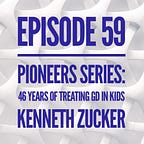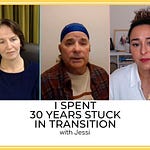Dr. Zucker is a registered clinical psychologist in Ontario. He received his Ph.D. at the University of Toronto in Developmental Psychology in 1982. He is a Professor (Status Only) in the Department of Psychiatry, University of Toronto, and in private practice. He was the Chair of the 2013 DSM-5 Work Group on Sexual and Gender Identity Disorders. He is a past President of the International Academy of Sex Research and has been the Editor of Archives of Sexual Behavior since 2002. Since 1976, Dr. Zucker has worked clinically with children and adolescents with gender dysphoria and their families. His research spans a variety of areas, including epidemiology, diagnosis, and assessment, associated mental health challenges, causal mechanisms, and long-term follow-up.
In our discussion, Ken describes the early years of working with childhood gender issues starting in the 1970s. We talk about the changes he’s seen in the kinds of kids, families, and therapists in the field. Politics has always been present in the world of gender identity treatment, but this came to a head for Ken when he was fired from his position at the CAMH hospital in Toronto 2015 after activists made some wild accusations and hospital administrators became fearful for their positions. After a three-year legal battle, he was finally vindicated and compensated. Even with his decades of leadership in the field, Zucker was not protected from this early cancel-culture manifestation. We talk about what his story means for individuals in practice and the field more broadly.
Links:
Dr. Zucker’s Website:
Sexual Identity Conflict in Children and Adults:
Amazon.com/Sexual-Identity-Conflict-Children-Adults/dp/071560774X
Extended Notes
Ken talks about how he accidentally got into the studies of gender identity disorders.
He shares about when he met Sue Bradley and joined her gender identity clinic for children and adolescents at the Clark Institute of Psychiatry in Toronto that she just started in the early ’70s.
What was it like working with this study, it being taboo at the time?
Ken also talks about the parents that brought their children to their clinics. What led them to seek help?
Anxiety about sexual orientation is still an issue that many parents struggle with.
Ken shares the shift in focus of their research studies from the ’70s to the early 2000s between children and adolescents.
How much impact do social media and the internet have with rapid onset gender dysphoria? Ken also shares his insights on this.
Ken talks about his experience and the various views of the subcommittees within the DSM (Diagnostic and Statistical Manual of Mental Disorders) during his involvement with them.
Ken gets into more details when their clinic got closed in 2015, being one of the early targets of cancel culture.
With newer administrative heads in their child program, the criticisms they received in 2015 would have been taken differently if it was still managed with Sue Bradley and their former bosses.
Ken shares what were his thoughts at this time. Did he think that his career would be ruined thereafter?
Ken also talks more about the lawsuits he then filed against newspapers, the hospital, and one of the administrators of their program due to libelous comments and defamation, among other things.
People being accused of things and these things going viral get them canceled as opposed to having an exchange of ideas has become a pervasive issue in the last years.
Ken also shares his interactions with both new and old colleagues and how they fear for their jobs if they don’t adhere to a particular point of view.
The consequence of the legal issues and politics within this field is terrorizing clinicians from wanting to work with this population.
Following his pursuit, clinicians are now pushing back and taking more risks in complicated fields and being more thoughtful in their process.
This podcast is sponsored by ReIME and Genspect. Visit Rethinkime.org and Genspect.org to learn more.
For more about our show: Linktr.ee/WiderLensPod











